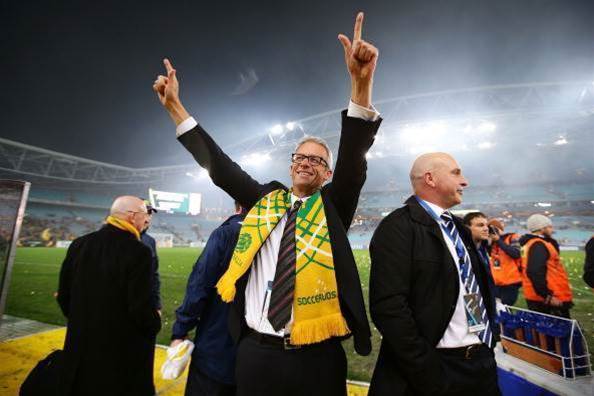It’s a huge challenge, yet one that could help transform football in Australia for generations.
FFA is now in the process of finding a CEO to replace the outgoing David Gallop.
Gallop leaves after seven years in the role.
During this time, he oversaw two Socceroos and Matildas World Cup campaigns and seven A-League seasons, as well as overseeing a myriad of grassroots challenges and board upheavals.

However, the FFA CEO role moving forward is being reshaped by recent events - the A-League is no longer part of the governing body's remit as they now focus on player development and grassroots.
With this in mind, the new CEO will need to be armed with a broader, more strategic skillset as he/she negotiates an updated set of goals over the coming years.
Stronger investment, better culture, player development, and grassroots engagement: there’s a shopping list of areas to improve.
And of course, working collaboratively with the FFA board, skilfully using limited resources and the challenging governance issues and structures within the game.
It’s a tough gig. But a challenge someone out there will relish.
These are eight areas the new CEO will excel at if he/she is to leave a positive and lasting legacy on football in Australia.
1: Plan, execute a compelling government funding strategy
Chronic underinvestment is football’s Achilles heel.
But it doesn’t have to be this way.
And the new CEO can lead a resurgence in this business-critical element for new facilities and programs.
The game’s strength - its huge grassroots numbers - can be leveraged for funding across local, state and federal budgets.
To achieve this, delivering a coherent, compelling policy narrative to those with influence on government budgets can deliver huge wins for football for years to come.
Working in partnership with the states, the new CEO needs to pull this policy project together, lead and execute it on a national scale.
If the new CEO can point to significant increases in investment at local, state and federal levels, he/she will be given a big tick of approval by the board and will have fixed a major problem going forward.
2: Work closely and learn from those with greater knowledge
I’d like to see the CEO be given access to a network of football entrepreneurs, administrators and influencers - say, those under the age of 30.
The world of business is evolving, in a digital and disruptive sense, at a super-fast pace.
It’s very important to stay abreast of changes in digital technology and social trends, and how they relate to football and sporting issues.
This would allow a fresher perspective to seep into the CEO role.
The FFA CEO cannot be left behind.
He/she must have access to growth mindsets and innovative ways of monetizing and governing the game.
Player development is another key area.
The recently appointed Rob Sherman has been tasked with the FFA Technical Director’s role.
He brings quality to this position and has the background and knowledge to make a success of it.
The new CEO needs to be in sync, supporting his plans and allow him the structure to implement the most effective strategy.
The national teams need this partnership to function effectively if Australia is to produce a new golden generation of female and male players.
3: Build a positive FFA culture, leave a legacy
Culture in an organization filters down from the top.
Have a look at those with leaders who engender a positive culture.
FFA in recent years has had a poor culture. Reflected in a high turnover in staff and a dysfunctional SMT.
If the new CEO can lead by example, empower others, inspire and bring pride back to working for FFA - and help develop the next generation of FFA’s leaders - this will be a key part of his/her legacy.
The capability should be built internally.
It’s time to bring trust and respect from the top down.
And galvanize FFA’s hard-working staff on the game's frontline, having them buy-in the vision for football’s future.
4: Introduce a savvy social media presence
The game’s narrative needs telling and selling better.
A new CEO, a business leader, who understands the power of social media will add another weapon to the game’s arsenal.
One who can use it strategically can help sell the game, explain decisions made and be a flag-bearer for the code, offering a quicker style of communicating with grassroots and media.
Social media opinion-makers and influencers don’t have to love you (will they ever?) but strategically maintaining a cross-platform social presence adds a fresh and much-needed touch to communications.
5: Direct media, don’t run from it
Never turn your back on questions at a press conference - that is not a good look.
Be clear and upfront with the media. And if you don’t know, be honest.
It’s better that than to hide behind dull corporate speak designed to obfuscate.
Football doesn’t need another colorless politician using Canberra-speak.
Stay in good with the media. Be the face of football. Be a salesperson and champion for the game.
And be accountable.
6: Have knowledge and love of the game
This passion for football - rather than the role being just another role for the CV - is another key in delivering on this role.
With this in mind, it’s more likely the new CEO may currently be working in football.
This will help in understanding how the game at grassroots is connected to the rest of the game’s pyramid.
This is the right time for a CEO steeped in Australian football history.
7: Bring consensus
It’s time an FFA CEO really explained to grassroots how and why decisions are made.
They pay their registrations - and hefty amounts too.
Canvas opinions on the ground, make decisions with a range of views as background to the decision-making process.
Their needs to be a consensus about how the game is run. And this needs explaining rather than put out as a press release.
8: Strategise with the newly independent A-League for mutual benefit
Just because the clubs got their way it doesn’t mean the FFA must operate completely unaligned.
The FFA through their new leadership can still find ways to help grow the A-League while helping boost the grassroots and national team player development.
A-League clubs need fans. And players. Likewise, FFA could use A-League clubs to promote grassroots and the game.
Working independently without helping each other is not the way forward.
The new CEO ideally should have an understanding of the A-League landscape and key decision-makers and have the skills to deal with them for mutual benefit.
Related Articles

Leckie seals new marquee deal as Good, Maclaren head to Asia

Socceroo-in-waiting seals Championship deal














